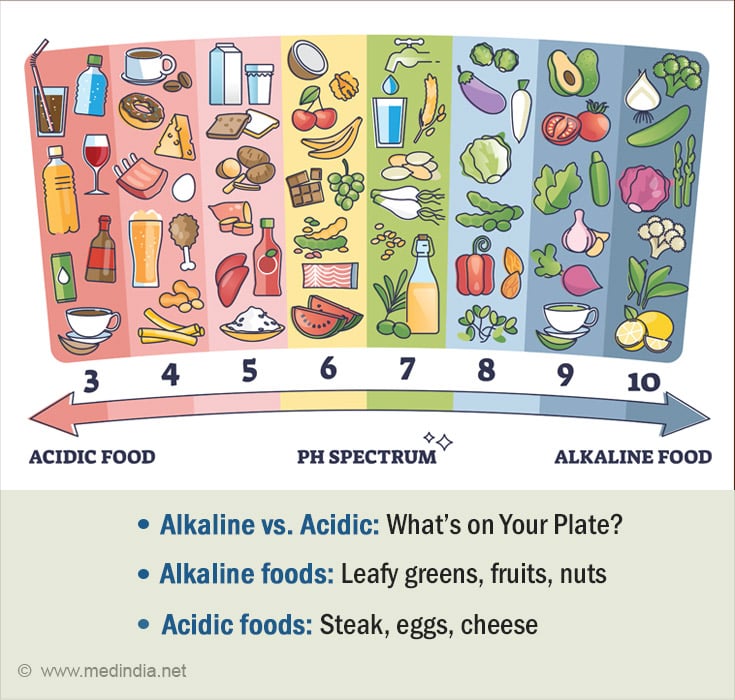- The alkaline diet: is there evidence that an alkaline pH diet benefits health? - (https://pubmed.ncbi.nlm.nih.gov/22013455/)
About
The alkaline diet promotes the consumption of alkaline foods over acidic ones. The fundamental principle of the alkaline diet is that foods that cause your body to create acid are unhealthy. Celebrities such as Victoria Beckham and Tom Brady helped popularize the diet.
The acid level in your body is referred to as pH. The alkaline diet is based on the idea that eating specific foods might cause your pH level to change. However, many of the diet's claimed benefits are not supported by scientific research. Everyone reacts differently to different diets, so always consult your doctor before beginning a new eating plan.
Did You Know?
The pH of mineral water can vary from acidic to alkaline, depending on its source! Some bottled waters claim to have pH levels as high as 9.5. #alkalinefoods #pHlevels
Scientists assess pH levels in a range of 0 to 14:
- pH of 0–6 indicates acidity.
- pH of 7 is neutral.
- pH of 8 or higher is alkaline.
Alkaline and Acidic foods
Alkaline foods have a high pH level, and acidic foods have a low pH. Alkaline foods include non-starchy vegetables, fruits, nuts like chestnuts or pumpkin seeds, and legumes like kidney or white beans. Acidic foods include beef, cheese, eggs, and cereals. Milk and natural fats are considered neutral.
How Does the Alkaline Diet Work?
The alkaline diet typically contains foods that are healthful and unrefined. According to the "science" behind this diet, consuming foods that increase your body's alkalinity can protect you from these illnesses while also helping you lose weight.
People who follow this diet occasionally use a specific dipstick to measure the pH of their urine. However, this test only measures the pH of your urine, not the complete body.
Alkaline Diet Menu
Most fruits and vegetables, soybeans, tofu, nuts, seeds, and legumes are alkaline-promoting foods. Dairy, eggs, meat, most cereals, and processed meals such as canned and packaged snacks and convenience foods are considered acidic and therefore prohibited. Most alkaline diet guides recommend avoiding alcohol and caffeine. Natural fats, milk, and sugars are termed "neutral." In an alkaline diet, it is recommended that you avoid or limit neutral foods.
Examples of alkaline foods are:
- Fruits: Apples, cherries, pineapple, avocado, bananas, apricots, and cantaloupe
- Non-starchy veggies: Broccoli, beets, asparagus, leafy greens, garlic, carrots, and cabbage
- Unsweetened fruit juices
- Mineral water
- Herbal tea
- Nuts and seeds: Chestnuts, pine nuts, and pumpkin seeds
- Fermented tofu or tempeh
- Certain grains, such as quinoa

Benefits of Alkaline Diet
The alkaline diet consists of nutritious, fresh meals. It prohibits the consumption of added sugars and other low-nutritional meals. Though the science behind the alkaline diet is limited, the dietary behaviors it supports can nonetheless provide health benefits. If you are vegetarian or have food allergies, the alkaline diet may be easier to follow.
Vegetarians and vegans: This diet is primarily vegetarian. It is also suitable for vegans, who avoid dairy products.
Gluten-free: The diet avoids wheat, but to totally avoid gluten, you must carefully read product labels, as gluten is found in many other foods as well.
Besides wheat, the diet excludes most other main dietary allergens, such as milk, eggs, peanuts, walnuts, fish, and shellfish. It is also beneficial for folks who want to avoid fat and sugar.
You do not need to purchase courses, books, or supplements to follow the alkaline diet. There are numerous free alkaline food charts available online, which identify foods that may be purchased at the grocery shop.
Alkaline diets may result in several health benefits(1✔ ✔Trusted Source
The alkaline diet: is there evidence that an alkaline pH diet benefits health?
Go to source):
- Increased fruits and vegetables in an alkaline diet help benefit bone health, reduce muscle wasting, and mitigate other chronic conditions including hypertension and strokes.
- An alkaline diet's increased growth hormone levels may benefit heart health, memory, and cognition.
- Alkalinity may provide an additional benefit for some chemotherapy drugs that require a higher pH.
Disadvantages of the Alkaline Diet
The alkaline diet has some limitations, which may make it difficult to follow. The level of effort is high. Some people find the alkaline diet difficult to maintain since it limits what they can eat. You may have to give up several meals that you are used to eating.
An alkaline diet restricts numerous foods, including meat. This diet is almost completely vegetarian. The vast majority of dairy and meat products are prohibited. Alcohol and caffeine, in addition to a variety of other meals, are prohibited. Some people may find it difficult to follow the diet because it excludes meat, processed foods, and other acidic items.
Furthermore, an alkaline diet makes it harder to eat out, so you may need to make more supermarket excursions. If you are new to cooking at home, it may take some time to learn how to prepare and cook your meals with fresh ingredients. While there are many alkaline diet items available for purchase, they can be costly. If you travel frequently for work or have a busy schedule, you may feel overwhelmed by the food selection and preparation.
Following an alkaline diet will be difficult for many people. Many of your favorite foods, which are allowed in moderation on other programs (such as lean meat, low-fat dairy, bread, and sweets), are prohibited here. Protein is only found in plant-based foods like beans and tofu. This means that you will need to supplement your protein and calcium intake with additional sources.









